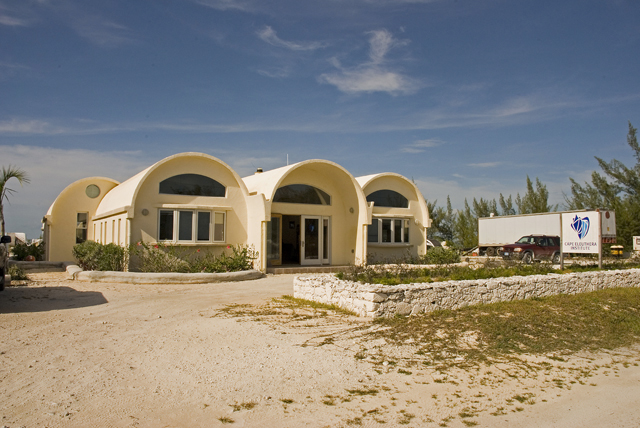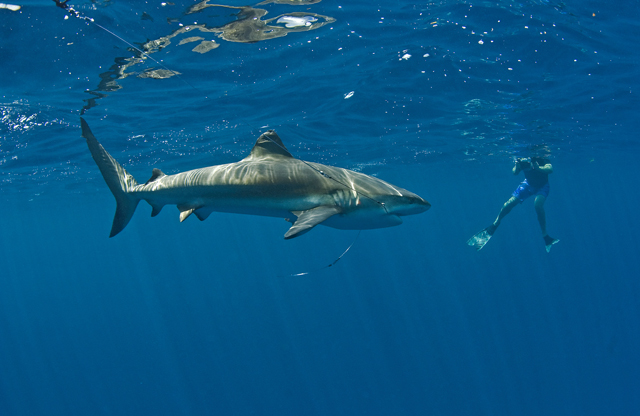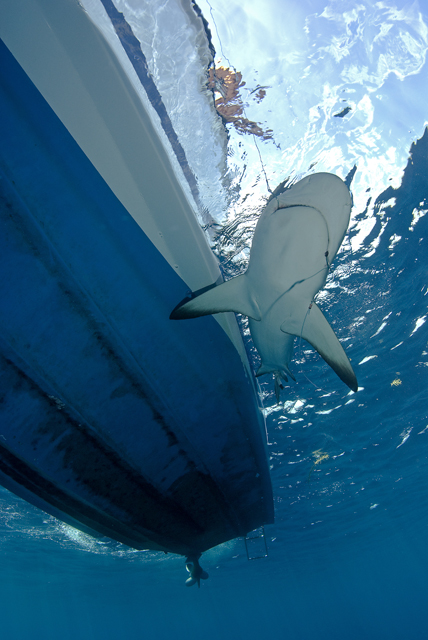Marine Life & Conservation Blogs
Our Future
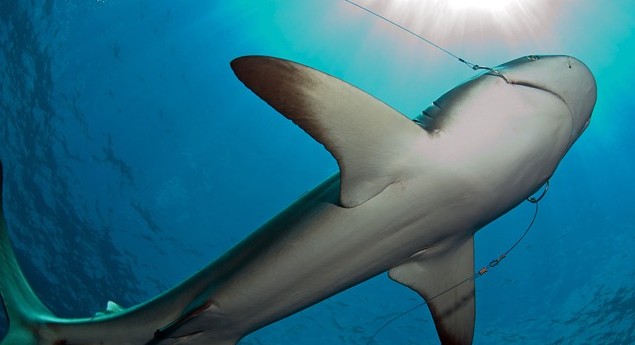
Concerns about natural resources and diminishing food supplies is at the forefront of every conscientious mind. But not everyone is taking a back seat view.
The Cape Eleuthera Foundation has been set up as a school and research institute exploring, improving and putting into practice natural ways of living and existing from our environment. Research Associate, Edd Brooks, said ‘our goal is to be 100% waste-free’. I was surprised to find such an interesting and worthwhile facility hidden away on Eleuthera, a remote island in the Bahamas, more famous for its links with Mariah Carey’s wedding rather than ecological breakthroughs.
The Foundation’s philosophy is to develop and build a number of systems that can sustain a community using only natural resources whilst minimising negative environmental impact. So in a nutshell, they have gone totally ‘green’ and are producing all their own food by aqua/agricultural means and then recycling any waste products to produce more food. It’s basically a closed loop system. 100% of all their power, for heating and lighting, is produced from Solar Energy and Wind Turbines. Bio Diesel (Vegetable Oil) is used to fuel any transportation, i.e. boats and trucks. Water for drinking and sanitation is captured from rainwater and 75% of the wood they’ve used to build the campus was grown from Casuarina Trees, an invasive species most people just disregard and burn.
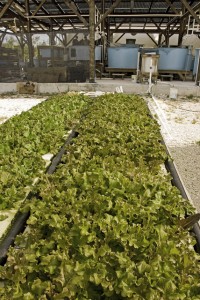
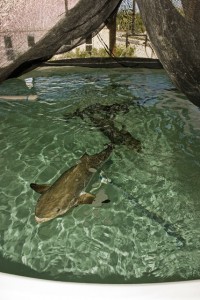 Surely this kind of research and development centre is where our future lies? Students from all over the world come and stay at the facility to conduct project work for schools, colleges and university degrees. Visiting Researchers and Scientists have a complete working laboratory at their disposal. This is the perfect environment for kids looking at careers in marine biology and related topics. It’s purely a ‘not for profit’ educational and research lab. Students and Researchers have to pay for the privilege but where better to conduct studies than a giant outdoor workshop in the Bahamas! Donations from privately owned businesses and organisations help support any new equipment purchases and building expansions.
Surely this kind of research and development centre is where our future lies? Students from all over the world come and stay at the facility to conduct project work for schools, colleges and university degrees. Visiting Researchers and Scientists have a complete working laboratory at their disposal. This is the perfect environment for kids looking at careers in marine biology and related topics. It’s purely a ‘not for profit’ educational and research lab. Students and Researchers have to pay for the privilege but where better to conduct studies than a giant outdoor workshop in the Bahamas! Donations from privately owned businesses and organisations help support any new equipment purchases and building expansions.
The Campus itself is basically split into two areas. The research centre has two 12-bed dormitories, timber framed classrooms, a common area, kitchen/catering facilities and gardens. The school has two wings. Each can accommodate up to 12 students. There is also a computer room, library, presentation rooms and wet and dry labs for research work. All within a stone’s throw of the sea.
A brand new Diving Centre has just been completed. It’s based in an impressive wooden building by the jetty. They also have 6 boats ranging from 19ft-40ft and 24 Sea Kayaks, used for 9-day school expeditions that circumnavigate the southern tip of Eleuthera.
There are about a dozen ongoing research programmes revolving around the marine environment. Aquaculture is the largest and most important ongoing project. Present worldwide fishing quotas are well exceeding regenerative capabilities (we have approx 50 years of wild fish stocks left). Although not a new concept, Aquaculture (fish farming) may well be the key. The first task is to find a species of fish that grows fast and doesn’t eat too much in the process. It also needs to be resilient to infection and disease. Cobia (Rachycentron canadum) is a pelagic species that grows up to 2m in length and can weigh as much as 68kg. It has a high food conversion ratio of 1kg of body mass for every 1.3kg of food it eats. The firm, white flesh is also very tasty and has become extremely popular in restaurants (prices are around $10-00 per kilo).
In 2003 the Institute began building a massive 3,000 metre/squared holding cage for the Cobia. The metal framework was positioned in 30 metres of water 1.5 miles off the coast by the Exuma Sound. This area is known to have reasonably strong currents and waves. Constant water movement helps prevent algae growth, which in turn reduces the risk of disease and parasites. Some of the young fish were lost in transit but around 10,000 fingerlings made it to the cage. Through 2005 the fish grew rapidly. Divers performed regular maintenance checks twice daily, cleaning away algae and taking out any dead or diseased fish. Fish mortalities were mainly due to poor quality feed. Then a Hurricane struck the island. Divers couldn’t get out to clear away the dead fish, which in turn, attracted the predators. Bull Sharks bit through the nets to get to the dead fish. More than 75% of the Cobia crop escaped through the holes. It was also a little disconcerting for the divers when they came face to face with a hungry Bull Shark inside the cage!
Later this year they will introduce a batch of home grown Cobia to the holding cage. To combat the Shark problem they have set up their own artificial ‘eco-system’ inside the cage. Groupers will eat any sick or dying fish before the Sharks are attracted and Gobies and Shrimp will act as cleaning stations to keep fish healthy.
Bonefish (Albula volpes) mortality rates is another high profile research project at the Institute. Florida Bonefish are a highly sought after, premier game fish that annually generates several billion dollars of revenue. Pound for pound they are known to be the best fighting fish in the ocean. They can grow up to 104cm in length and weigh 10kg. It’s mainly caught for sport and then released. The flesh itself isn’t considered to be very tasty. The Bonefish lives in shallow inshore tidal flats and co-exists with its main predator, the juvenile Lemon Shark. Part of the project is looking at the impact catch-and-release angling is having on the mortality rate of Bonefish. It’s been found that the stressed Bonefish are releasing a chemical that the Lemon Sharks are ‘homing in’ on. Once Students have identified this chemical handling and release methods can be adapted to stop the fish getting stressed.
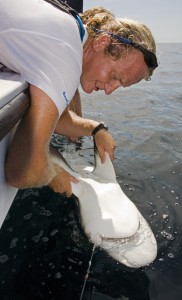
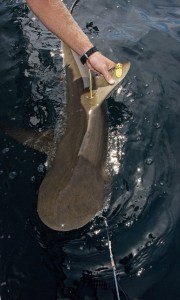 Edd’s primary research project involves monitoring the diminished Shark populations in the Bahamas. There has been a huge amount of worldwide media coverage highlighting the current plight of Sharks. Hundreds of thousands of Sharks are being slaughtered each year just for their fins. The Bahamas totally banned commercial Shark fishing in 2004. Long lining was also banned way back in 1993. But ‘local’ Shark numbers are still declining. Edd thinks the majority of Bahamian Sharks make long migrations into other territorial waters where they might not be protected. This specifically affects species like Tigers, Oceanics and Hammerheads. There is also the possibility that coastal tourism development is having an impact on Shark nurseries and inevitably this has a knock-on effect.
Edd’s primary research project involves monitoring the diminished Shark populations in the Bahamas. There has been a huge amount of worldwide media coverage highlighting the current plight of Sharks. Hundreds of thousands of Sharks are being slaughtered each year just for their fins. The Bahamas totally banned commercial Shark fishing in 2004. Long lining was also banned way back in 1993. But ‘local’ Shark numbers are still declining. Edd thinks the majority of Bahamian Sharks make long migrations into other territorial waters where they might not be protected. This specifically affects species like Tigers, Oceanics and Hammerheads. There is also the possibility that coastal tourism development is having an impact on Shark nurseries and inevitably this has a knock-on effect.
Around ten times a month Edd sets a buoyed long line with around 30 baited hooks. After one and a half hours the line is hauled in and any Sharks caught are recorded, tagged and released. Some are fitted with simple acoustic tracking devices. Edd surgically implants the small transmitters inside the Sharks. Edd has also placed compact VR2 receivers (Hydrophones) at certain points around Eleuthera. These listen out for any ultrasonic pings coming from the tagged Sharks. The recorded information is then downloaded onto his Computer back at base. The receiver records the time stamp and the ID number of the Shark as it passes. He can see any repetitive patterns and habitual movements that are forming. This year Edd is mainly focusing on the benefits of using baited remote underwater video surveys (BRUVS) to check on Shark numbers instead of long lining. BRUVS are far less stressful for the Sharks as there is no direct contact. His research will hopefully be used as a basis for other studies. Monitoring these movements will provide information on critical periods in Shark development so guidelines/restrictions can be put in place to protect the Sharks habitat.
Other current marine related projects include the population recovery of the Spiny Sea Urchin (Diadema antillarum), Patch Reef preservation, Lionfish surveys, Aquaponics for growing plants and restoration of the now thriving Wetland area.
It’s a known fact that our natural resources are running out fast. In the next few decades any studies made by R & D facilities like the Institute are going to be invaluable. Their findings may well be shaping our future. Long term it looks as though we could all be in for a bumpy ride.
Information
Edd is putting together a Shark tagging/research programme for visiting divers. This will give them a chance to go out on the boats, bait the lines, tag the Sharks and basically find out more about Shark ecology. They will also get a tour of the institute and presentations about ongoing research projects. The lucky one’s might even get a homegrown banana from the ‘poo’ garden!
Contact Details
Website: www.ceibahamas.org
E-mail: info@ceibahamas.org
Tel: 609 945 0710
More Information
Website: www.islandschool.org
Website: www.dcmsbahamas.org
Website: www.capeeleutherafoundation.org
Blogs
Saba’s Plan for a Coral Comeback

Saba has an exciting new initiative to restore its coral reefs. This new project, running from 2024 to 2026, will focus on reviving key species in the island’s underwater ecosystems. With a collaborative team from the Saba Conservation Foundation (SCF) and Van Hall Larenstein (VHL) University of Applied Sciences, the project aims to restore both corals as well as sea urchins.
This initiative is centered around coral restoration, specifically reviving two essential coral species—staghorn coral (Acropora cervicornis) and elkhorn coral (Acropora palmata). By mapping parent colonies and using a technique known as coral gardening, SCF will create and maintain coral nurseries. These corals will eventually be outplanted at key reef sites around Saba to not only expand the number of coral colonies, but also provide essential fish habitat. The project focusses on installing coral nurseries, training staff with the newest techniques and starting with the restoration of key reef sites.

Reef Cleaners to the Rescue
It’s not just corals getting a makeover—this project also shines a spotlight on the essential role of grazers, particularly sea urchins. VHL is leading the charge on cultivating and restocking two key sea urchin species, West Indian sea egg (Tripneustes) and long-spined sea urchin (Diadema), known for their ability to keep algae in check. By removing algae, which are important competitors of corals, they help the coral to thrive. By restoring these “reef cleaners,” Saba’s project will give corals the breathing room they need to grow, setting the stage for a healthier, more balanced marine ecosystem.
From Tiny Urchins to Big Goals
The project will be funded as part of the Dutch Government’s Nature and Environment Policy Plan (NEPP) 2020-2030 for the Caribbean Netherlands, a comprehensive initiative aimed at conserving and restoring the unique natural environments of the Dutch Caribbean islands, including Saba, St. Eustatius, and Bonaire. This project is aiming for big milestones: build and maintaining coral nurseries, the expansion of urchin cultivation facilities, and the creation of a dedicated research center. By 2026, the project hopes to ramp up coral and grazer restoration, with the ultimate goal of extending these efforts across the Dutch Caribbean. By linking local initiatives to broader regional goals, Saba’s restoration project promises to leave a lasting impact on both the environment and the community.
Find out more about the DCNA at dcnanature.org.
Blogs
Reef-World marks two decades of marine conservation: strengthening impact amid coral reef threats

Empowering ocean stakeholders to tackle future challenges and ensure the survival of coral reefs and humanity
2024 marks the 20th Anniversary of The Reef-World Foundation’s tireless efforts for global coral reef conservation. The UK charity is the international coordinator of the UN Environment Programme’s Green Fins initiative, known as the leading voice in sustainable marine tourism. Today, Reef-World released its 2023-2024 Impact Report outlining a year of substantive growth and impact in its marine conservation programmes.

Impact Report Highlights:
- Impressive improvements in environmental behaviours to protect coral reefs by the marine tourism industry as the global participation of Green Fins increases.
- Continued capacity building for government and NGO staff to effectively manage marine tourism activities in Asia, Caribbean and Red Sea regions.
- For the first time in Green Fins’ 20-year history, tourism operators have achieved ‘Best Environmental Performer’ status by demonstrating the lowest possible environmental impact in their environmental assessments. In 2024, three dive operators achieved this challenging milestone.
- Significant increases in global participation of Reef-World’s innovative digital conservation tools.
- 138 Green Fins dive operator members achieved the strict threshold for PADI Eco Center recognition.
- Developed four new educational materials and translated two into 16 languages to support the marine tourism industry in achieving sustainability targets.
- Establishing a new Reef-World Development strategy and recruiting new roles – Development and Programmes Managers.
- Reef-World’s board welcomes new Chair and Trustees strengthening organisational leadership.

Reef-World started as a one-person mission to inspire and empower communities to act in conserving and sustainably developing coral reefs and related ecosystems. Today, the team of 12 continues to meet this mission by inspiring and empowering the global marine tourism community to be exemplary sustainability leaders by using the Green Fins guidelines and tools to simultaneously use and protect the world’s precious reefs.
In April 2024, the fourth global coral reef bleaching event was confirmed. Reef-World’s work has never been more urgent as the marine environment, and the benefits they provide humanity, continue to be eroded by global threats. The reduction of local threats, like those from the marine tourism industry, is an essential step to ensuring a future where coral reefs survive and continue to support the millions of people who depend on their ecosystem benefits. Reef-World’s work buys time for coral reefs and related ecosystems to be resilient to the impacts of global threats.
“Right now our corals are facing the greatest fight of their existence as the terrifying predictions of the steps towards their complete extinction are starting to come true. But all is not lost, reefs are resilient and they have existed on this planet for millions of years. We must take action now, to buy time for reefs by reducing threats facing them and allowing them to react and adjust to the changing environment they need to survive in.” – Chloe Harvey, Executive Director
Looking Forwards:
Like coral reefs, the Reef-World team needs to be resilient in the face of the complex challenges of the conservation sector. Reef-World has invested significantly in developing a Culture of Care to ensure the well-being of its team on a daily basis, continuing to be an exemplary employer to enable its team to best achieve the mission for coral reef conservation.
With the foundations of a Culture of Care and organisational development laid, Reef-World is emerging from the end of a natural organisation life cycle, that brings the challenges of growth and scale, stronger than ever. With a new strategy in place to generate much needed resources, Reef-World is excited for the opportunities to leap forward, continue to scale our impact and lean into new innovations and untapped opportunities for marine conservation.
We continually strive to become a forward-thinking organisation that delivers on our goals and commitments to our stakeholders with fresh approaches and not being afraid of steering away from a “normal approach.” This approach is not only applied to our programmes of work but also internally and carries over to our Culture of Care for our team.” — JJ Harvey, Operations Director

The Reef-World Foundation is immensely grateful for the continued support of its grant funders: UN Environment Programme, IUCN’s Blue Natural Capital Financing Facility, Adventure Travel Conservation Fund, PADI Aware Foundation, and World Nomads Footprints Program.
Reef-World would also like to express its gratitude to international partners whose vital support has resulted in significant tangible benefits for our work and mission: PADI; Professional SCUBA Schools International (PSS); Explorer Ventures; 1% for the Planet; ZuBlu; Snorkel Venture, GSTC; Dive O’Clock; Seven Dragons; DiveAssure and Eco Beach, without whom these achievements would not be possible.
The full 2023–2024 Annual Impact Report is available on Reef-World’s website.
-

 News2 months ago
News2 months agoIconic SS United States to become the World’s Largest Artificial Reef
-

 News3 months ago
News3 months agoBook Review – 52 Assignments: Underwater Photography
-

 Gear News3 months ago
Gear News3 months agoDYNAMICNORD – New German diving brand enters the British market
-

 News3 months ago
News3 months agoExploring Cenote El Pit: A Diver’s Dream
-

 Gear News3 months ago
Gear News3 months agoTry BARE drysuits (and maybe even win one!) this Friday with Sea & Sea at North West Dive Fest
-

 Marine Life & Conservation3 months ago
Marine Life & Conservation3 months agoBook Review: Coral Triangle Cameos
-

 Blogs2 months ago
Blogs2 months agoDive the Egyptian Red Sea this Autumn with Regaldive
-

 News3 months ago
News3 months ago2024 Ocean Art Underwater Photo Competition Announced


